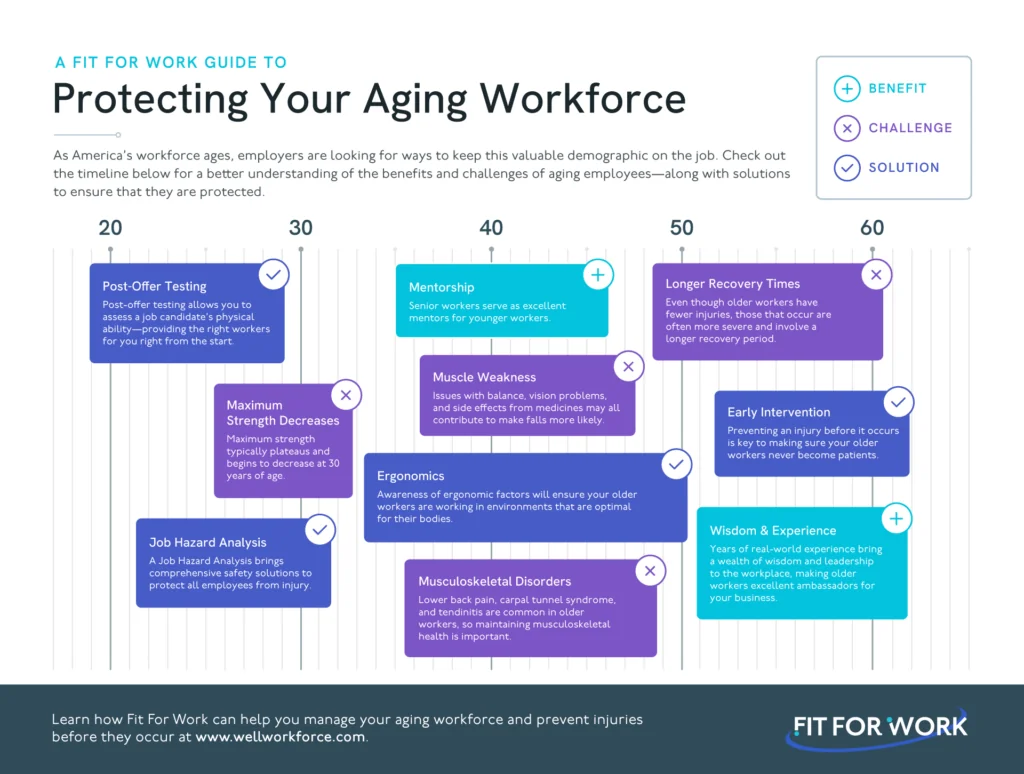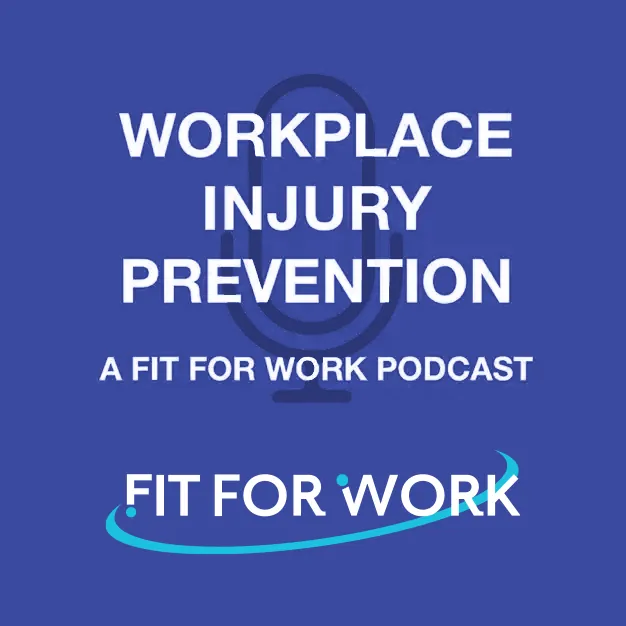By Bethany Gardner, OTD, OTR/L
Vice President of Service Development, Fit For Work
In today’s competitive labor market, organizations are not just looking to fill positions—they are striving to attract, retain, and nurture top talent. Robust employee career development programs are critical not only to help employees achieve their professional goals, but also to drive organizational growth and innovation.
According to a 2022 Society for Human Resource Management Research Report, 84% of organizations agree that building a learning culture enhances organizational resilience and fosters a better work environment, while 76% of employees are more likely to stay with a company that offers continuous learning and development programs.
How can investing in employee development transform your workplace? The benefits to employees are clear: growth opportunities, greater job fulfillment, enhanced job security, and a renewed willingness to take on new challenges once equipped with new skills.
For employers, the advantages are equally compelling. Investing in your team can boost recruitment and retention by positioning your company as an employer of choice, while also increasing employee engagement, bridging skills gaps, and empowering staff to better serve customers. The result? Higher customer satisfaction, improved brand loyalty, and a more successful business overall.
Five Key Strategies
Developing and executing a successful program, however, requires more than good intentions. Career development programs must be approached as strategic business initiatives with intentional planning, clear goals, and an ongoing organizational commitment to fostering a learning culture.
Here are five keys to implementing a successful employee career development program.
- Align Career Development with Your Business Goals
Career development programs should not exist in silos within your organization. Employee development is not merely a function of Human Resources or Learning and Development, but an integral part of your company’s strategic objectives. Alignment ensures that as employees learn and grow, they develop relevant skills and expertise to drive your business forward. In addition, get buy-in from all stakeholders in your company; build support early and involve leaders at all levels so that they can champion the initiative across the organization.
Given each company’s unique needs, there is also no one-size-fits-all approach. Start by identifying the core skills that are critical to your organization’s success. Whether it’s customer service, leadership development, or technical expertise, tailor your program to address these needs. By doing so, employees see clear growth opportunities that are directly relevant to their roles, while boosting your company’s competitive edge. Furthermore, help employees see how their development goals not only support their own career but also aid larger business objectives.
Alignment and goal setting aren’t a one-time task. To keep your program relevant, it’s important to regularly revisit and adjust your goals as your business evolves and needs change over time.
- Create Personalized Development Plans
In the same way that no two companies have the same needs, neither do your employees. A generic, cookie-cutter approach to career development won’t yield the best results for your employees or your business. Personalization is key. Tailor learning to individual career aspirations, current skill levels, and development needs to help your employees choose their own adventure.
Start by assessing each employee’s current skills, interests, motivations, and growth needs through surveys, performance reviews, and career conversations. Use this data to create customized development plans with a variety of learning formats, including formal training, on-the-job experiential learning, mentoring, and coaching. Frontline managers should collaborate with employees to set individual SMART (Specific, Measurable, Achievable, Relevant, Time-bound) goals to drive accountability and a higher likelihood of success.
Leverage technology solutions to equip managers with the tools they’ll need to document and track employee progress in achieving their development goals.
- Foster Growth Through Regular Feedback and Coaching
Career development is an ongoing, nonlinear journey, with employees benefiting from consistent, constructive feedback. Development conversations must extend beyond the traditional annual review cycle into regular 1:1 check-ins to truly drive a feedback culture. Effective 1:1s should go beyond just tactical updates on goal progress. These conversations should create space for open discussions about challenges employees are facing, allowing leadership to identify issues and offer the support needed. By making employees feel heard, these meetings strengthen relationships between managers and staff, fostering open communication and trust.
Encourage managers to adopt a coaching mindset, helping employees identify tangible action steps to achieve their goals. Employees also need to understand how their performance is measured. When launching a new development program or onboarding a new employee, 1:1s may need to be more frequent at first. This ensures that both the employee and the organization receive timely feedback, allowing for any necessary adjustments or course corrections to stay on track toward meeting their goals. Once new programs and new employees hit their stride, continue with regular check-ins, adjusting the frequency as needed to maintain alignment and support ongoing development.
Provide managers with the training and support they need to deliver meaningful feedback and facilitate effective career development discussions.
- Build a Culture of Lifelong Learning
While formal training is a necessary and valuable component, identify ways to make development a natural part of employees’ daily routines. E-learning platforms and mobile apps have made learning accessible anytime, anywhere to support just-in-time learning. Employees can learn at their convenience and immediately apply new skills in real-world scenarios. Offer a variety of hands-on learning opportunities, such as cross-departmental projects and stretch assignments that allow employees to apply new skills. These experiences expose employees to new challenges, encourage innovation and creativity, and support deeper learning and mastery.
Create social learning opportunities for employees to share key takeaways from their learning experiences, fostering a culture of shared learning and collaboration.
- Measure Progress and Celebrate Success
Successful career development programs are data-driven and outcome-focused. Establish key metrics upfront to measure the program’s effectiveness, such as employee engagement scores and skill attainment metrics. Regularly track progress and solicit feedback from employees to identify areas for improvement.
Equally important is celebrating milestones and successes. Recognize employees who have achieved their development goals and celebrate their achievements through established company rewards and recognition programs, awarding digital badges, or using other incentives in alignment with your company values and culture. Highlighting employee and business success stories can inspire others who are earlier in their development journey or not yet engaged in a career development program.
Share your successes externally via social media and other channels to showcase your company’s commitment to career development and to help attract top talent.
Conclusion
Investing in employee career development isn’t a luxury—it’s a competitive advantage. By aligning development efforts with business goals, personalizing learning, fostering open and regular feedback, integrating learning into daily workflows, and measuring and celebrating success, you’ll establish a program that inspires your employees and drives organizational success.
In doing so, you’ll position your company as an employer of choice, with a reputation for nurturing talent and fostering career growth. The result is a more engaged, skilled, and loyal workforce ready to serve your customers and meet the challenges of tomorrow.

Bethany Gardner is Vice President of Service Development with Fit For Work, an established national provider of innovative workplace injury prevention services. Bethany holds a Bachelor of Science in Biology and a Doctorate in Occupational Therapy. She is a licensed occupational therapist with over 16 years of experience in health and safety with various industries including manufacturing, construction, and healthcare. She has worked onsite with industrial clients to provide rehabilitative, preventive, and consultative services. In addition, Bethany collaborated with a university-based occupational safety and health research team to develop health and wellness training and intervention programs for workers across many industries. In her current role, Bethany is responsible for developing and strategically growing current and emerging Fit For Work services and initiatives geared toward operational excellence.





